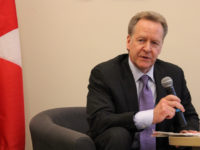The House of Commons Standing Committee on International Trade released its detailed study on the priorities of Canadian stakeholders in NAFTA earlier today. I appeared before the committee to discuss intellectual property and digital trade issues in September. The report includes notable recommendations on culture (retain the cultural exemption in NAFTA) and digital rights (ensure that digital trade provisions do not undermine Canadians’ privacy rights or security of their data, a nod to concerns over data localization and data transfer rules). It also features an important discussion on the intellectual property chapter, with clear support for retaining a made-in-Canada approach consistent with international standards.
Blog
Net Neutrality Briefing: My Appearance Before the Standing Committee on Access to Information, Privacy and Ethics
As the concern over U.S. net neutrality rules heats up, last week I appeared before the House of Commons Standing Committee on Access to Information, Privacy and Ethics to provide committee members with an hour-long briefing on the issue. The audio of the appearance can be found here. My opening remarks, which emphasized the Canadian net neutrality framework, the potential impact of U.S. policies, and the implications for privacy and freedom of expression, are posted in full below.
Canada’s Lead Negotiator Confirms Government Seeking Net Neutrality Safeguards in NAFTA
Steve Verheul, Canada’s lead NAFTA negotiator, appeared before the Standing Committee on International Trade earlier this week to provide an update on the negotiations. In addition to confirming Canada’s commitment to a cultural exception (Verheul acknowledged that the U.S. “has not reacted positively”), Verheul was asked about the digital trade chapter. He indicated that there has been significant progress on issues such as online consumer protection and privacy. He also touched on two other issues: one a Canadian ask and the other a U.S. priority.
From a Canadian perspective, Verheul said that Canada wants a net neutrality provision included in NAFTA, noting:
Not Just Bell: Shaw Calls on CRTC To Support Website Blocking
As Bell develops plans to apply to the CRTC to create a website blocking agency, it is also working to create a coalition of supportive companies. The initial Canadaland report noted that the coalition could include Rogers, Cineplex, and Cinema Guzzo. Rogers has since indicated that it is still considering whether to join the coalition. As I note in my post today on the submissions to the CRTC’s consultation on broadcasting, Shaw is now also making the case for website blocking, devoting several pages to supporting it. Unlike Bell, however, it does not reference a specific agency mandated to support blocking, focusing instead on court-ordered blocking.
![By The White House from Washington, DC (Foreign Leader Visits) [Public domain], via Wikimedia Commons https://upload.wikimedia.org/wikipedia/commons/9/9f/Donald_Trump_Justin_Trudeau_2017-02-13_05.jpg](https://www.michaelgeist.ca/wp-content/uploads/2017/12/trumptrudeaufeb2017-200x150.jpg)










